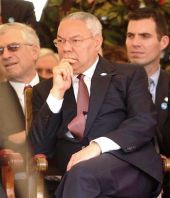Challenges ahead for Sudan peace deal
By Andrew England, The Financial Times
NAIROBI, Jan 10, 2005 — The Sudanese government and southern rebels sealed a peace deal yesterday, ending one of Africa’s most intractable conflicts and raising hopes of a new era for the continent’s largest country.

|
|
Secretary of State Colin Powell, at Nairobi’s Nyayo Stadium, Sunday, Jan. 9, 2005 to witness the Sudan Comprehensive Peace Agreement. US ambassador at the UN John Danforth on his right. (AP).. |
Amid smiles and handshakes, vice-president Ali Osman Taha and John Garang, leader of the rebel Sudan People’s Liberation Army (SPLA), signed the historic agreement at a ceremony in Nairobi.
“This is a glorious day for the Sudan,” President Omar Hassan al-Bashir said before an audience of African leaders and western diplomats. “It’s not only a deal that ended a protracted war of untold suffering, but it is a new contract for all Sudanese.”
But despite the optimism there are numerous potential pitfalls ahead. The crisis in Darfur poses the most serious threat to stability.
The 21-year war caused an estimated 2m deaths and displaced 4m people after it erupted for a second time in 1983 following an 11-year hiatus. The SPLA launched the rebellion to gain a greater share of wealth and power for the south, which is inhabited mainly by Africans who follow traditional beliefs or are Christian.
Elitist, Arab-dominated administrations have governed Sudan since independence in 1956 and the nation remains underdeveloped.
Mr Garang, who should be sworn in as vice-president within months, said the deal would guarantee equality for all groups and religions – people in the east and west also complain of marginalisation.
The signing marked the beginning of a six-month “pre-interim” period, during which the parties have to draw up a new constitution, and form a transitional government in Khartoum and a separate administration for the south.
A six-year transition period will begin in July and national elections are supposed to be held before the end of the fourth year. At the completion of the transition, southerners will vote in a referendum on whether to secede.
But the Darfur crisis, which erupted in February 2003, casts a shadow over the process and the task of implementing the agreements will be huge. The security situation there has worsened in recent weeks and the western insurgents, who have similar demands to the SPLA’s, have become factionalised, hindering the chances of an early political solution for that conflict. There have also been concerns that eastern groups could take up arms.
The Islamic government and SPLA are both seen as autocratic military regimes that must overcome mutual mistrust and convince other groups in the north and south they will be included in the process, if it is to have any chance of success.
The international community’s political and financial support for the transition is also deemed critical. Billions of dollars will be needed to help rebuild the country, particularly the south, where there is not a single paved road and large-scale repatriations are expected. The UN has estimated some 9,000 troops will be required to monitor the agreements.
However, key peace dividends that Khartoum expected, including the lifting of US sanctions, a normalisation of US relations and help to solve its $26bn (?20bn, £14bn) debt, will remain on hold until the situation in Darfur improves.
